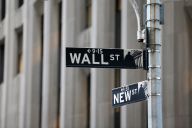Featured articles

Why Michael Burry just sold all his stocks
Michael Burry just sold over $70 million in stock, liquidating his entire portfolio except for one stock, doubling down on a company that other investors are fleeing in droves.
15:28, 18 July 2025

Euro forecast: Third-party price target
Read our EUR/USD forex rate forecast for 2025 and beyond, with insights from third-party analysts and market experts
12:06, 4 July 2025

Crypto CFDs: Popular cryptocurrencies for trading
Discover which cryptocurrencies are trending for CFD trading in 2025 – from bitcoin to newly listed coins like SUI and PEPE.
10:46, 31 July 2025

Okta stock forecast: Third-party price targets
Okta (OKTA) is trading at $91.19 (as of 8 September 2025 at 14:31 UTC), within an intraday range of $89.91–91.75.
8 hours ago

Palantir stock forecast: Third-party PLTR price target
Palantir Technologies (PLTR) is a US software company focused on data fusion and analytics platforms, headquartered in Denver, Colorado.
9 hours ago

Amazon stock forecast 2025-2030: Third-party price target
Amazon (AMZN) is trading at $234.11 at 14:52 UTC (8 September 2025), close to the session high of $234.35, within an intraday range of $232.76-$234.35.
9 hours ago

Apple stock forecast: Third-party AAPL price target
Apple (AAPL) is a global technology company, best known for its iPhone, Mac, and growing services ecosystem.
10 hours ago

Trading the Dow 30 After a Weak NFP
The technical overview remains unchanged in both daily and weekly time frames, while in sentiment CoT speculators raised their net sell bias.
10:34, 8 September 2025

US 500 index forecast: Third-party US 500 price target
Discover the US 500 (US 500) index price forecast for 2025 and beyond, with analyst price targets and more.
12:59, 5 September 2025

US Wall Street 30 index forecast: Is US30 a Good Investment?
Discover the US Wall Street 30 (Dow Jones Industrial Average) index price forecast for 2025 and beyond, with analyst price targets and more
13:08, 3 September 2025

Trading the Nasdaq 100 ahead of Jackson Hole
Rotation out of tech for two sessions in a row hits the tech-heavy index and a couple key short-term technical indicators, but both clients and CoT speculators remain majority buy.
07:20, 21 August 2025

Five factors driving gold to record highs
Major tailwinds are pushing gold to new all-time highs.
13:49, 4 September 2025

Trading gold prior to Non-Farm Payrolls
The technical overview remains volatile given the uptick in intraday price action combined with record highs, while in sentiment still a story of majority long bias among both clients and institutional traders.
07:21, 4 September 2025

Trading silver at 2011 highs
It has made quick work of the infamous $40 level to comfortably move within the handle, and it’s still a story of majority long sentiment among traders both large and small
10:04, 1 September 2025

Palladium price forecast: Third-party predictions 2025-2030
As of 21 August 2025, the palladium price stood at $1,110 an ounce – up from $909 at the start of the year, but still some distance from recent highs.
13:00, 29 August 2025

Trading EUR/USD Amidst ECB and US CPI Events
It has been a story of relative calm and slight positive technical bias ahead of the fundamental events, with CoT speculators net long while Capital.com clients shift to the middle.
07:08, 11 September 2025

UK interest rate forecast for the next five years
Explore the UK interest rate forecast with third‑party predictions, trends, and a five‑year outlook for projected UK interest rates.
10:51, 8 September 2025

Australian dollar forecast: Third-party price target
What’s next for AUD/USD? Here’s our round-up of third-party Australian dollar forecasts, with analysts’ insights, price history, and forex rate drivers for CFD traders.
19:56, 18 August 2025

US dollar forecast: Third-party data round-up
US monetary policy and global headwinds continue to sway major forex pairs – leaving many asking: what’s next for the US dollar forecast? Dive into our roundup of third-party insights and expert price predictions for 2025 and beyond.
15:44, 18 August 2025

Trump coin price prediction 2025-2050: Third-party TRUMP insights
Read our Official Trump coin price prediction for 2025 and beyond, with TRUMP insights from third-party analysts and market experts.
08:31, 8 September 2025

Shiba Inu price prediction 2025-2050: Third-party SHIB insights
Read our Shiba Inu price prediction for 2025 and beyond, with SHIB insights from third-party analysts and market experts.
12:18, 5 September 2025

Bitcoin price prediction: Third-party price target
Read our Bitcoin price prediction for 2025 and beyond, with BTC insights from third-party analysts and market experts
17:19, 4 September 2025

Bonk coin price prediction 2025-2050: Third-party BONK insights
Read our Bonk coin price prediction for 2025 and beyond, with BONK insights from third-party analysts and market experts
10:20, 4 September 2025
